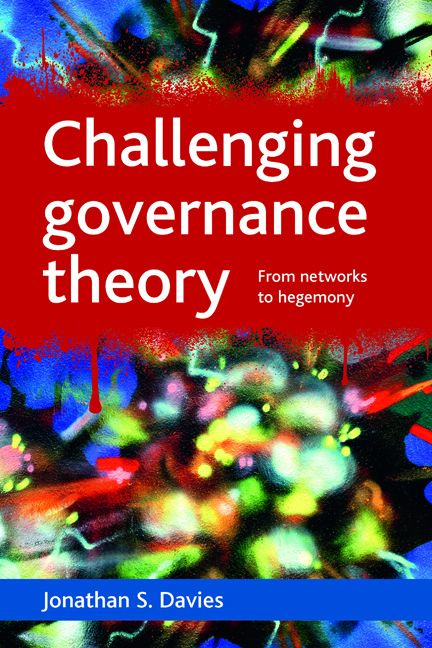Book contents
- Frontmatter
- Dedication
- Contents
- List of tables
- Preface
- Introduction
- one The network governance milieu
- two Network governance policy
- three The limits of network governance
- four Beyond the transformation thesis
- five From network governance to hegemony
- six Gramscian governance research
- seven Conclusion
- References
four - Beyond the transformation thesis
Published online by Cambridge University Press: 07 September 2022
- Frontmatter
- Dedication
- Contents
- List of tables
- Preface
- Introduction
- one The network governance milieu
- two Network governance policy
- three The limits of network governance
- four Beyond the transformation thesis
- five From network governance to hegemony
- six Gramscian governance research
- seven Conclusion
- References
Summary
Introduction
This chapter takes a detour from the core subject matter of governance theory. It argues that to understand why authentic network governance does not seem to be emerging we need first to challenge underlying assumptions encapsulated in the idea that we are moving from the logic of structures to the logic of flows. The chapter argues that, on the contrary, there are powerful historical continuities in the social structure that make network governance highly improbable. The discussion draws on Marxist social theory and political economy, marginalised by mainstream governance, public policy and political science scholarship for decades (Hay, 2010, p 18) but now enjoying something of a renaissance in the face of a disastrous accumulation crisis and the widespread revival of class resistance to austerity. The chapter begins by discussing the Marxist approach to structure and agency and proceeds to explain why Marxism rejects post-traditional claims about epochal change in the nature of capitalism, states and classes. This exposition of alternative background assumptions provides the platform for developing in Chapter Five a Gramscian conception of network governance as part of the struggle for hegemony.
Structure and agency
Giddens’ conception of structure and agency is based on the notion of reciprocal causation, the idea that two or more terms in a relationship are interdependent and influence each other. Post-traditional governance theorists such as Bogason (2000, p. 95) find structuration appealing as a non-determinist conception of the relationship between structure and agency. The Third Way rests on this perspective, liberating Giddens and like-thinking politicians from any crisis-theoretical critique of capitalism and enabling them to substitute their vision of the individualised citizen living a connectionist lifestyle, free from historical constraint. Structuration theory is influential, particularly in neo-institutionalist accounts of network governance (Bogason, 2000; Bachmann and Zaheer, 2008, pp 543-51), where the relationship between institutional rules and norms and the actors engaging them is iterative and reflexive. From a critical-realist perspective, it tends to conflate structure with agency by failing to take the causal powers of either term sufficiently seriously and, furthermore, understating the contradictory or dialectical nature of the relationship between structures, within structures, and between structures and agents discussed later in the chapter (Callinicos, 2006, p 185).
Information
- Type
- Chapter
- Information
- Challenging Governance TheoryFrom Networks to Hegemony, pp. 75 - 100Publisher: Bristol University PressPrint publication year: 2011
